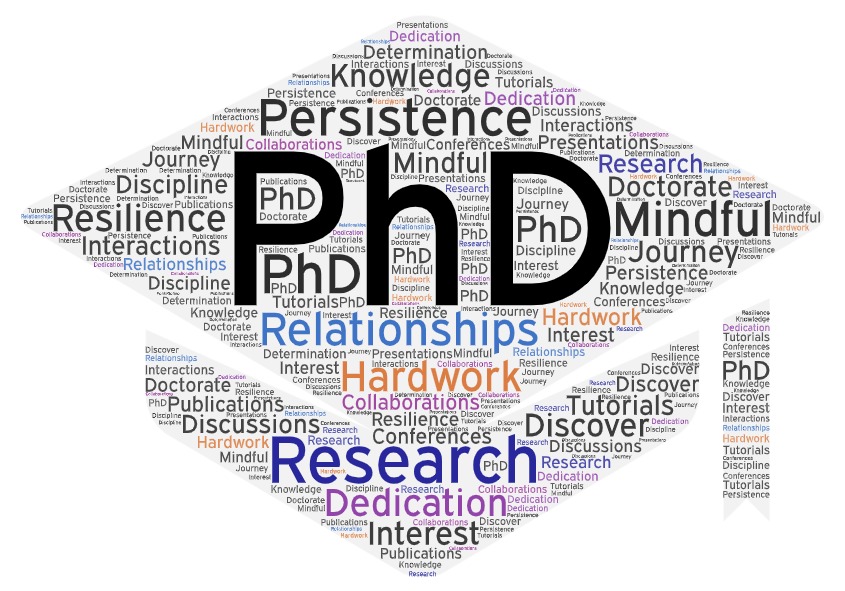Ph.D. is a journey. The duration of this journey may range from three to seven years. When you are a Ph.D. student, every hour counts for it brings you one step closer to the beautiful moment you receive your desired degree.
During this journey, candidates discover themselves as they handle all kinds of pressure. They realize what triggers them, interests them, and motivates them. The journey consists of three stages: coursework, comprehensive examination, and thesis writing. The first stage ensures that students acquire an in-depth knowledge in their chosen field of interest. They learn how to identify a research gap, formulate a hypothesis, and choose a methodology for the research questions. Students then enter the second stage, where they appear for an area-specific comprehensive written examination and a viva-voce, whereby experts test their knowledge base. On passing these exams, Ph.D. students are ready to move to the most important stage of thesis writing.
Before designing the thesis structure, the title of their work, or sitting down to write, students are required to narrow down the research problem. Let me help you understand this. Picture yourself at a library you visit regularly. First, you decide which book best captures you. Second, you also decide the chapter you wish to rewrite because you think you could make it better or that you disagree with what is being said. Selecting a book and a chapter represents the students’ process of writing a thesis by determining their area of interest and then selecting a topic with specific research questions. How, then, does the job get accomplished?
It begins with a rigorous literature review. A good literature review solidifies your knowledge as well as helps you formulate your research questions and a framework for your thesis. The process is a lot like the game “Finding Waldo.” Once the part is done, your thesis is a sum total of your hard work and persistence, with fixed hours going into designing, structuring, and writing, under the guidance of your supervisor. In addition to thesis work, Ph.D. students also participate in other academic pursuits like teaching assistantships (TAs), tutorials, and planning workshops and conferences. All these activities prepare them for the different roles that they may perform as academicians later in life. Throughout these activities, students interact with a variety of people – from faculties, staff, and other students to honorable guests and keynote speakers. It is a golden opportunity for them to build valuable relationships and broaden their horizons. Since relationship management plays a vital role in the life of a Ph.D. student, acquiring relevant soft skills becomes invaluable.
Although the list may not be exhaustive, the following skills undoubtedly help conquer the challenges faced by Ph.D. students:
Get better at time management: Cautious distribution of time is the most effective practice for Ph.D. students as they juggle their time between various activities. The key is knowing how much time is to be given to each activity and focusing on learning. The conscious control and division of time also help maintain good physical and mental health.
Be collaborative and open to new ideas: Ph.D. students seek help and provide the same to others for a variety of reasons. Instead of having frequent disagreements over your own opinions or being defensive, it is best to understand that people perceive things differently based on their experiences in life. Being open to a new point of view enhances your overall growth and improves your intellect. It allows you to become more collaborative. You may discover new ideas or a better solution to an existing problem together.
Be an effective communicator: Listening is vital for a Ph.D. student because it helps collect valuable input from friends and professors and gives way to new ideas and perceptions. It is best to listen well and then respond suitably because cross-functional teams typically work together with different goals. Reaching a middle ground with an optimum solution is only achieved through effective communication. Also, a discussion induces clarity in thoughts. Therefore, effective communicators have more discussions and fewer arguments.
Be mindful and not mind-full: Being kind to oneself is essential because a Ph.D. is a journey of self-discovery, and the course load can be demanding and lengthy. As you transition from one stage to another, you go through different experiences, from facing paper rejections to health issues and personal conflicts. If a mistake is made, it is best to accept it, learn from it, and continue to move forward. In the process, you must not be too harsh on yourself. To cope with the ups and downs, practice mindfulness. Being present in the moment and practicing meditation can lead to a balanced mental health and better outputs.
Follow good work ethics: Try to adapt the 3Ds in your daily tasks – Discipline, Determination, and Dedication. Being ethical and respectful to everyone around you distinguishes you as a scholar.
A Ph.D. is an experience, and not just a course, title, or degree. Ph.D. students must try to focus their energies on what can be controlled. Also, we must not forget to take some time out to stay in touch with whatever motivates us, be it music or some family time.
Author : Shimona Shriya
About Author : Student of Ph.D. 01



